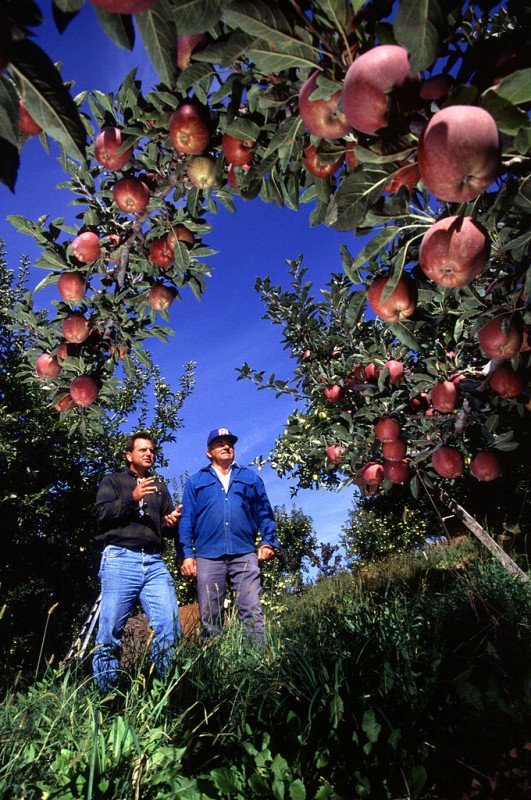Northwest Five Consortium pilots its first intensive summer course
Students will live, study, and travel across three campuses
TACOMA, Wash. – This summer students at five Washington and Oregon liberal arts colleges have the chance to join a new, on-the-road course studying locally grown food and its impact on our lives, economy, and politics.
In this jointly-run course—a pilot project from the Northwest Five Consortium—students live and study across the Northwest, with stopovers at three colleges: Whitman College, University of Puget Sound, and Willamette University. The three-week course starts July 26 and is the first for-credit offering from the partnership.
Northwest Five Consortium (NW5C) is a two-year-old collaboration between Lewis & Clark College (Portland, Ore.), University of Puget Sound (Tacoma, Wash.), Reed College, (Portland), Whitman College (Walla Walla, Wash.), and Willamette University (Salem, Ore.). The colleges are spread over 24,000 square miles, making the alliance an unusual one in the U.S. higher education landscape.
The five-way partnership is a “first” for the Pacific Northwest, and reflects a growing trend across the country for colleges to pool their talent and resources in order to enhance student outcomes. NWC5 is offering this intensive, hands-on course—Foodsystems Northwest: Circuits of Soil, Labor, and Money—with the intent of rolling out a continuing roster of for-credit courses.
Classes created via the partnership allow small, private, nonprofit colleges to share teaching and study resources, while enriching the expertise of faculty. Students also gain a broader perspective by working with classmates hailing from other locales and by learning from experiences in the field.
The students enrolled in Foodsystems Northwest will live, eat, travel, and study together under the direction of four professors from three member colleges. They will make numerous field trips—which could include a dairy farm, apple terminal, chicken plant, urban garden, food bank, Tagro compost plant, and organic farm—as they trace the themes of soil, labor, and money across the Northwest “foodscape.”
“Over the past two years, Northwest Five working groups have been preparing the groundwork for new course proposals, and organizing forums for sharing knowledge in academic fields, technology, peer tutoring, and library science,” said Kris Bartanen, academic vice president of University of Puget Sound and a NW5C steering committee member. “We have many projects in the pipeline, and it is exciting to see the first collaborative course become a reality. Faculty leadership in our NW5C work has been very impressive.”
This summer’s course will begin Saturday, July 26 at Whitman College with a focus on the political economy of the food system, turning a global lens on the industrial wheat farms, chicken processing plants, and large-scale dairy operations of the Walla Walla Valley. From there the class will travel to University of Puget Sound, where the focus will shift to urban agriculture and food justice. Students will address questions of poverty and access to food, urban planning, and the challenges of growing food in the city of Tacoma. Finally they will travel to Willamette University where students will live and work at the student-operated Zena Forest & Farm, putting sustainable agriculture methods into practice and exploring the opportunities and obstacles associated with smaller-scale, organic farming in the Willamette Valley.
“Because the course is intensely experiential, students will be expected to bring both curiosity and a strong commitment to the success of the course,” said Emelie Peine, lead instructor and assistant professor in international political economy at University of Puget Sound.
Also teaching the course are Aaron Bobrow-Strain, global food politics researcher and associate professor of politics at Whitman College; Jennifer Johns, associate director of Sustainable Agriculture Programs at Willamette University; and Peter Wimberger, biology professor and director of the Museum of Natural History at University of Puget Sound.
To date students from Puget Sound, Whitman College, and Willamette University have signed up for Foodsystems Northwest. Each college is making its own decision about institutional financial aid and units of credit to award.
NW5C working groups are discussing potential collaborations in areas ranging from environmental sciences to neuroscience to visual culture to Latin American studies. The consortium’s mission of enhancing the student academic experience through the enrichment and development of the teaching faculty is supported by an $800,000 grant from The Andrew W. Mellon Foundation.
To learn more about the Northwest Five Consortium visit nw5c.org or send an email message to nw5c-info@willamette.edu
Press photos of each NW5C campus is available upon request.
Photos on page: Top right: Apple orchard in Washington (Courtesy U.S. Department of Agriculture); Above left: Students work at Zena Forest & Farm, an organic farm run by Willamette University (Courtesy Willamette University); Above right: Combine harvesting wheat in Eastern Washington, by Charles Knowles.
Tweet this: Learning about #food, a NW5 Consortium 1st @lewisandclark @univpugetsound @Reed_College_ @whitmancollege @willamette_u


